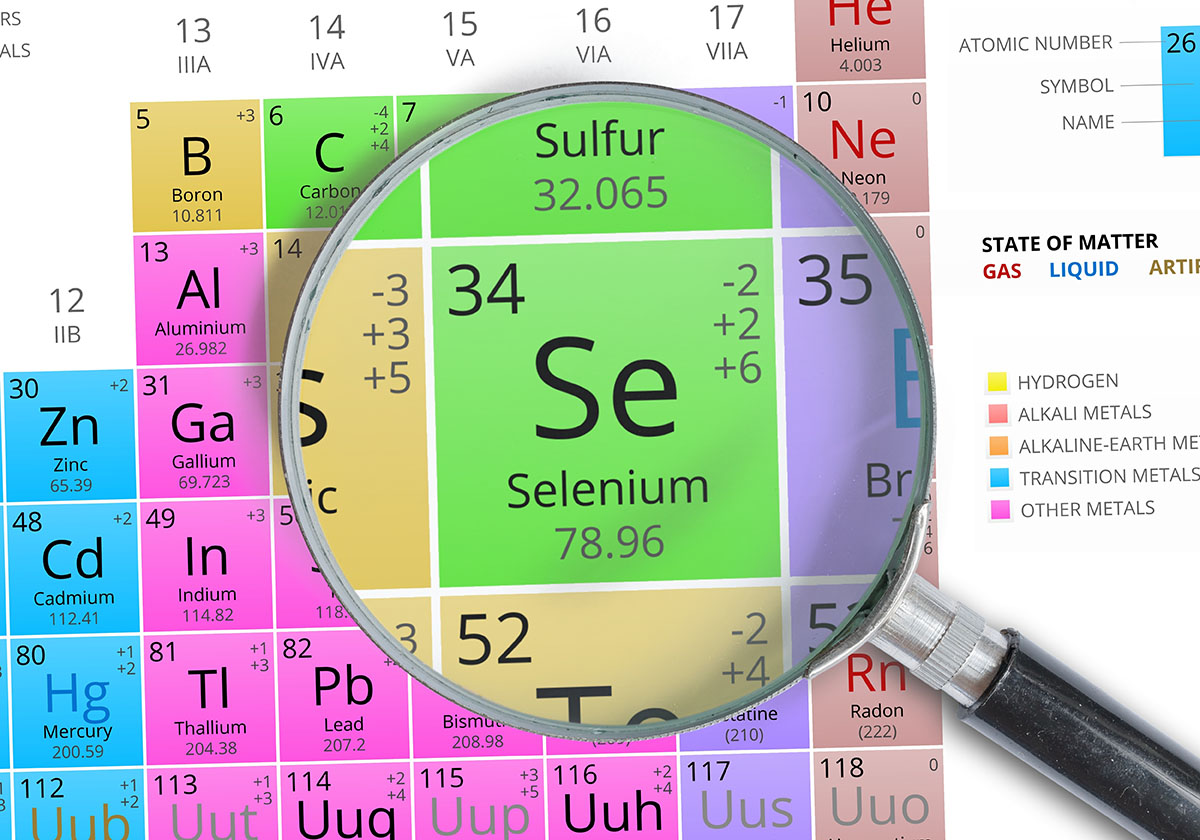
< Back
selenium
Definition
Selenium is a chemical element with the symbol Se and atomic number 34. It is a non-metal that is commonly found in the Earth's crust. Selenium is important for humans and animals because it helps to protect cells from damage.
Selenium is a trace element, meaning that only small amounts are needed for good health. The recommended daily intake of selenium for adults is 55 micrograms (mcg).
Selenium is found in many foods, including seafood, meat, eggs, and dairy products. It is also added to some foods, such as bread and breakfast cereals.
Selenium deficiency can cause a number of health problems, including hair loss, fatigue, and muscle weakness. Selenium toxicity is rare, but it can cause hair loss, nausea, and vomiting.
Selenium is important for the following:
- Protecting cells from damage: Selenium is a powerful antioxidant that helps to protect cells from damage caused by free radicals. Free radicals are unstable molecules that can damage cells and lead to diseases such as cancer and heart disease.
- Supporting the immune system: Selenium helps to support the immune system by increasing the production of white blood cells. White blood cells are responsible for fighting off infection.
- Maintaining thyroid function: Selenium is essential for the production of thyroid hormones. Thyroid hormones are important for many bodily functions, including metabolism, growth, and development.
- Protecting against DNA damage: Selenium helps to protect DNA from damage caused by free radicals. DNA damage can lead to cancer and other diseases.
How can the word be used?
Selenium is a chemical element.

Different forms of the word
Noun:
- a chemical element with the symbol Se and atomic number 34.
Etymology
The word "selenium" comes from the Greek word "selene", which means "moon".
The first recorded use of the word "selenium" in English was in 1818.
The word "selenium" is a Greek word, and it is not related to any other languages.
Question
Where might you find selenium?
AQA Science Exam Question and Answer
Question:
Explain the importance of selenium in human health and its role as an essential trace element, highlighting its functions and potential consequences of deficiency or excess.
Answer:
Selenium is a vital trace element that plays a crucial role in human health. It functions primarily as an essential component of selenoproteins, a group of enzymes with diverse functions. One of its key roles is acting as an antioxidant, protecting cells from oxidative damage and supporting the immune system.
Selenium is also essential for proper thyroid function, as it is incorporated into thyroid hormones that regulate metabolism and energy production. Additionally, selenium is involved in DNA synthesis, reproduction, and the maintenance of healthy skin and hair.
Deficiency in selenium can have serious consequences. It can lead to weakened immune function, increased susceptibility to infections, and thyroid disorders like goitre. In severe cases, selenium deficiency may result in a condition known as Keshan disease, which affects the heart.
Conversely, excessive selenium intake can lead to toxicity, a condition known as selenosis. This can cause symptoms such as hair loss, brittle nails, gastrointestinal disturbances, and neurological issues.
In conclusion, selenium is an essential trace element that plays vital roles in human health, including antioxidant protection, immune support, and thyroid function. Maintaining an appropriate balance is crucial to prevent both deficiency-related health issues and the potential risks associated with excess intake.